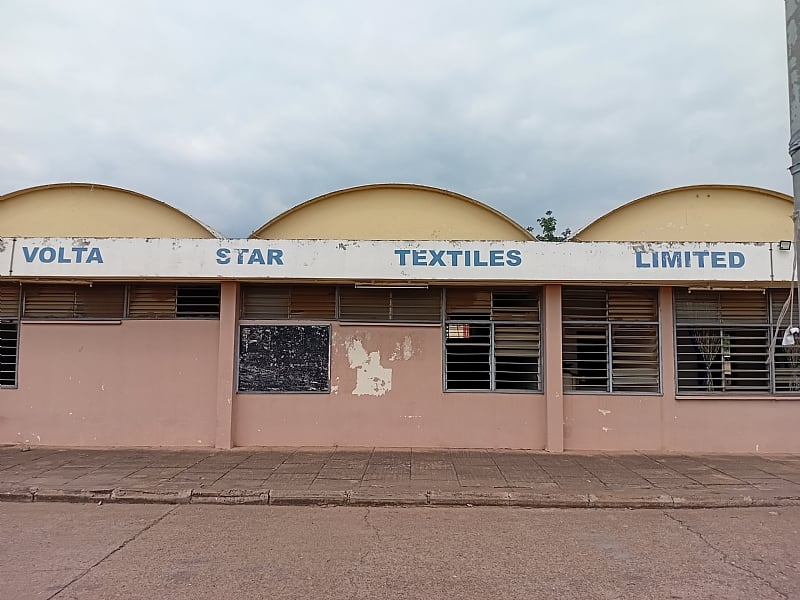Volta Star Textiles LTD (VSTL), formerly Juapong Textiles Limited, a once prominent Ghanaian textile manufacturer, seeks a substantial financial injection to revive its operations. During the launch of the Volta Trade and Investment Fair at the VSTL premises, Managing Director Jerome Kwaku Dunyo announced the company requires between $25 million and $100 million to restart production. The lower figure would allow for partial restoration, while the full $100 million, reflecting their comprehensive business plan, would facilitate complete modernization and ensure maximum impact. This investment is crucial not only for the company’s resurgence but also for the revitalization of the surrounding town of Juapong and the broader Ghanaian textile industry, which has experienced a significant decline in recent decades.
VSTL, established in 1968, held a significant position within Ghana’s industrial landscape, producing high-quality grey baft for both domestic and regional markets. It was a major employer in the Volta Region, contributing to the overall national economic prosperity. The company’s history reflects the broader narrative of Ghana’s textile sector, which once boasted 16 thriving factories employing over 25,000 people and contributing approximately 12% to the national GDP. However, liberalization policies, coupled with the influx of cheap imports, primarily from Asia, led to the closure of most of these factories, including VSTL in 2005. This closure resulted in massive job losses, leaving over 1,400 workers unemployed and severely impacting the local economy. A brief revival attempt in 2007, under the rebranded name Volta Star Textiles with technical support from China, ultimately failed due to outdated machinery, accumulating debt, and high electricity costs, leading to another closure in 2014.
The current push for revival is supported by various stakeholders, including the Volta Regional Coordinating Council, the Ministry of Trade and Industry, and the Presidency. Mr. Dunyo acknowledged the instrumental role of Hon. Samuel Okudzeto Ablakwa, the regional minister and Member of Parliament for North Tongu, in advocating for Juapong’s industrial resurgence. The decision to host the Volta Trade and Investment Fair at the VSTL premises is seen as a symbolic gesture, highlighting the commitment to attracting investment and breathing new life into the once-bustling industrial town. Mr. Dunyo expressed confidence in the renewed interest from both government and private sectors, emphasizing President John Dramani Mahama’s commitment to reopening the factory. The fair provides a platform to showcase the investment potential and underscore the importance of reviving this vital industrial hub.
The challenges facing VSTL and the broader Ghanaian textile industry are multifaceted. The influx of secondhand clothing, estimated at $121 million in imports in 2023, further exacerbates the situation, creating an unsustainable cycle of consumption and waste. A significant portion of these imported garments end up in landfills or pollute coastal areas, posing a serious environmental concern. Moreover, the lack of a robust domestic cotton industry forces Ghana to rely on expensive imports, increasing production costs for local manufacturers. Outdated machinery and high energy tariffs also hinder competitiveness. These factors, combined with the legacy of past closures and economic hardship, present significant hurdles to revitalization.
Despite these obstacles, there is optimism about the potential for a successful revival. Experts advocate for a comprehensive approach that addresses the key challenges. This includes investing in modern, energy-efficient machinery and exploring renewable energy solutions to reduce operational costs. Establishing strategic international partnerships, similar to the previous collaboration with China but with a focus on sustainable practices, is considered essential for securing technical expertise and funding. Developing a robust local cotton industry by incentivizing farmers and establishing processing facilities is crucial for securing a reliable and cost-effective raw material supply. Implementing protective measures against unfair imports and leveraging Ghana’s rich textile heritage, particularly in kente and African print designs, to build a competitive export brand are also key strategies for long-term success.
The African Continental Free Trade Area (AfCFTA), headquartered in Accra, presents a significant opportunity for a revived VSTL to access a wider African market. By combining modern technology with a sustainable approach to production, including a focus on raw material sourcing and environmentally friendly practices, VSTL can position itself as a key player in the African textile industry. Stakeholders believe that with concerted efforts from the government, private investors, and the local community, VSTL can overcome the challenges and contribute to a broader national industrial strategy. The revival of VSTL is not just about restoring a factory; it’s about revitalizing a community, reclaiming a lost heritage, and contributing to a more sustainable and prosperous future for the Ghanaian textile industry. The hope is that Juapong’s story will transition from one of decline to one of revival, symbolizing the resilience and potential of Ghanaian industry.


